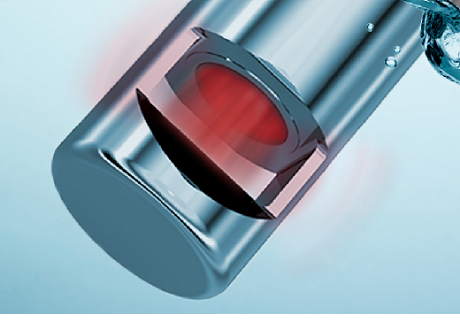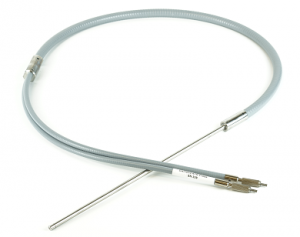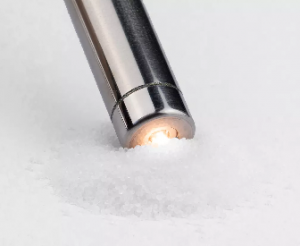

art photonics GmbH, founded in Berlin in 1998, provides fiber optic solutions for connecting spectroscopic measurements and in-situ process monitoring. With the optical fibers and immersion probes manufactured and distributed by the company, the spectroscopic instruments are capable of on-site reaction monitoring and production process monitoring. Spectrophotometers, spectrofluorometers, Raman spectrometers and FTIR instruments of various makes with their own adapters and couplers or those provided by art photonics become suitable for connection with the optical fibres.
 FTIR ATR immersion probes with fiber optics
FTIR ATR immersion probes with fiber optics
Due to the suitability for the wide range of user needs and different reaction conditions, the immersion ATR probes can be manufactured with a combination of crystals of different material quality and fiber optics with a PTFE or PEEK seal. In this way, the pressure resistance of the probes in the range can vary from 10 to 200 bar, while their temperature range can vary from -150 to +250 °C. The ATR crystals can be made of diamond (600 – 1900 cm-1), silicon (600 – 3100 cm-1), germanium (600 – 3100 cm-1), zinc selenide (600 – 3100 cm-1), zirconium dioxide (1550 – 9000 cm-1 or 400 – 2200 nm), sapphire (260 – 1300 nm) or silver halide (600 – 3100 cm-1 or 1550 – 5000 cm-1). The optical fiber can be made of quartz, CIR (chalcogenide) or PIR (polycrystalline, silver halide AgCl:AgBr). Another important aspect when choosing the right probe is the pH value of the medium, which can greatly influence the material quality of the applicable crystals.
Mid IR reflection probes
The wavenumber range of reflection probes used in the mid-infra range can be between 600 – 2500 cm-1 or 1600 – 7000 cm-1 and are suitable for measurements between 0 – 80 °C at atmospheric pressure.
Raman immersion probes
Robust probes, suitable for usage in industrial environment (PAT). They can also be connected to Raman spectrometers equipped with one or more lasers, and are manufactured taking into consideration individual needs.
Transflection probes for UV-Vis-NIR measurements
The immersion part of the transflection probes used in the wavelength range of 260 – 1200 nm or 400 – 2200 nm, can be made of acid-resistant steel or Hastelloy C22 (nickel-chromium-molybdenum-iron-tungsten) alloy. They are suitable for measurements under conditions of 0-50 bar and 0 – +200 °C.
UV-VIS-NIR reflection probes
The wavelength range of the reflection probes can be between 200 – 1200 nm or 380 – 2500 nm and they are suitable for measurements under conditions of 0 – 10 bar and 0 – 150 °C.
 Diffuse reflection probes
Diffuse reflection probes
The diffuse reflection probes can be used in the wavelength range of 400-2200 nm under conditions of 0-50 bar and 0-200 °C.
Fluorescence probes
The specially designed probes ensure the path of the excitation light and the collection and transmission of the emitted light to the detector. The wavelength range of the reflection probes can be between 200 – 1200 nm or 380 – 2500 nm. They are suitable for the fluorimetric monitoring of reactions with a pressure of 0 – 10 bar and a temperature of 0 – 150 °C.
The downloadable catalog provides a detailed tabular description of the other properties, dimensions of the probes as well as the various probe and optical fiber combinations.
For further information and in case of requests for special probes not listed so far, to be used under special reaction conditions, ask the staff of our office for help!

